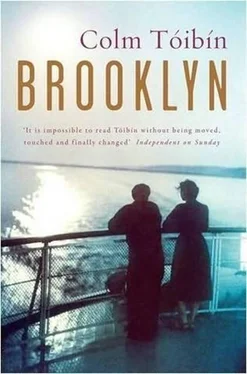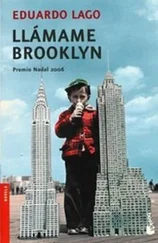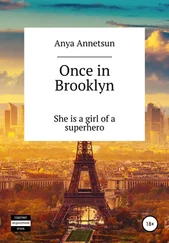Tony was so wrapped up in the game that it gave her a chance to let her thoughts linger on him, float towards him, noting how different from her he was in every way. The idea that he would never see her as she felt that she saw him now came to her as an infinite relief, as a satisfactory solution to things. His excitement and the excitement of the crowd began to lift her spirits until she even pretended that she could follow what was happening. She cheered for the Dodgers as much as anyone around her; and then she followed Tony's eyes, looking at what he was pointing to, and sat back silently with him when the team seemed to be losing.
Finally, after nearly two hours everyone stood up. She and Tony and Frank arranged to meet at the queue for the hot-dog stand closest to their seats after she had been to the bathroom. Since she was thirsty now and felt, when she had found them at the head of the line, that she wanted to be as much a part of everything as she could, she ordered a beer too, her first ever, and tried to run the mustard and ketchup along the hot dog with the same flourish as Tony and Frank.
By the time they got back to their seats, the game had resumed. She asked Maurice if it was really only half over and he explained that in baseball there is no half time, the break comes after the seventh inning near to the end and it's more of a pause-a stretch they call it. It struck her that he was the only one of the four brothers who had any sense of the depth of her ignorance of the game. She sat back and smiled to herself at the thought of this, its strangeness, how little it appeared to matter to her even in those moments when she found what was happening on the field most totally bewildering. All she knew was that luck and success were once more, for one reason or another, slowly evading the Brooklyn Dodgers.
Because she spent Thanksgiving with Tony's family, his mother thought that Eilis could come for Christmas too and seemed almost offended, asking if their food was not to her taste, when she refused. She explained that she could not let Father Flood down and was going to work in the parish hall for a second year. Tony and his mother told her several times that someone else could take her turn and do her work, but she was adamant. She felt slightly guilty at their assumption that she was performing an act of selfless charity when she would also, she knew, be happier in the parish hall working than spending a long day with a supper the night before in the small apartment with Tony and his family. She loved them, each of them, and found the differences between the four brothers intriguing, but sometimes she found the pleasure of being alone after a lunch or a supper with them greater than the pleasure of the meal itself.
In the days after Christmas she saw Tony every evening. On one of these evenings he outlined to her the plans they had, how he, Maurice and Laurence had bought at a bargain price a plot of land on Long Island that they were going to develop. It would take time, he said, maybe a year or two because it was a good distance from services and it looked like nothing except bare land. But soon, they knew, the services would reach there. What was empty now, he said, would within a few years have paved roads and water and electricity. On their plot there was enough space for five houses, each with its own garden. Maurice was going to evening classes in cost engineering and Tony and Laurence would be able to do the plumbing and the carpentry.
The first house, he explained, would be for the family; his mother longed for a garden and a proper house of her own. And then, he said, they would build three houses and sell them. But Maurice and Laurence had asked him if he wanted the fifth house and he had said that he did and he was asking her now if she would like to live in Long Island. It was near the ocean, he said, and not far from where the train stopped. But he did not want to take her there yet because it was winter and it was bare and bleak with nothing but waste ground and scrubland. The house would be theirs, he said, they could plan it themselves.
She watched him carefully because she knew that this was his way not only of asking her to marry him but of suggesting that marriage had been already tacitly agreed between them. It was the details of how they would live, the life he could offer her, that he was presenting now. Eventually, he said, he and his two brothers would set up a company and they would build houses. Now they were saving money and making plans, but with their skills and the first plot in their possession it would not be long and it would mean that they could soon, all of them, have a much better life. She said nothing in reply. She was almost in tears at what he was proposing and how practical he was as he spoke and how serious and sincere. She did not want to say she would think about it because she knew how that might sound. Instead, she nodded and smiled and reached out and held his two hands and pulled him towards her.
She wrote once more to Rose, using her sister's office address, and told her how far things had gone; she attempted to describe Tony, but it was difficult without making him sound too boyish or silly or giddy. She mentioned that he never used bad language or curse words because she thought it was important for Rose to know that he was not like anyone at home, that this was a different world and in this world Tony shone despite the fact that his family lived in two rooms or that he worked with his hands. She tore the letter up a few times; she had made it sound as though she were pleading for him, instead of merely trying to explain that he was special and that she was not staying with him simply because he was the first man she had met.
In her letters to her mother, however, Eilis had never once mentioned him; even though she had described Coney Island and the baseball game, she had said only that she had gone with friends. She wished now that she had made one or two casual references to him six months ago so that it might not come as such a surprise now, but when she made an attempt to put him into her letters to her mother she found that it was not possible without writing in a full paragraph about him and where she had met him and what he was like. She found that she postponed doing this every time she tried.
When Rose replied, the letter was brief. It was clear to her that Rose had heard once more from Father Flood. Rose said that Tony seemed very nice, and, since they were both young, they would not have to make any decisions, and that the best news was that Eilis would, by the summer, be a qualified bookkeeper and could start to look for experience. Rose imagined, she wrote, that Eilis must be really looking forward to getting off the shop floor and having a job in an office, which would not only pay more money but be easier on the legs.
At Bartocci's, everyone had become more relaxed about the coloured customers and Eilis was moved to different counters a number of times. Since Miss Fortini had told the Bartoccis about her passing her exams and being in her final year, Miss Bartocci had said that if any vacancy arose as a junior bookkeeper even before she was fully qualified then they would consider her.
The second-year course was simpler because Eilis was not as afraid of what might appear on the exam paper. And because she had read the law books and taken notes on them, she was able to follow most of what Mr. Rosenblum was talking about. But she was still careful to miss no lectures and not to see Tony except for each Thursday, when he walked her home, each Friday, when they went together to the dance at the parish hall, and each Saturday, when he took her to a diner and a movie. Even when the winter began to descend on Brooklyn, she liked her room and her routine, and as the spring came she began to study on the nights when she came home from her lectures and on Sundays as well so she could be sure to get through her exams.
Читать дальше












